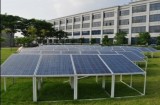Bathtub Faucet,Tub Faucet,Delta Tub Faucet,Delta Bathtub Faucet Heshan Janno Kitchen and Bath Technology Co.,Ltd , https://www.janno-ks.com Japan is expected to significantly reduce its solar energy subsidies in 2013, according to recent reports from industry analysts and solar companies. Market speculation suggests that the current feed-in tariff (FIT) of 42 yen per kilowatt-hour could drop to between 36 and 32 yen, marking a potential decline of 15% to 25%. The proposed changes are likely to be implemented in March or July, which has already triggered a surge in installations during the first quarter of 2013 as developers rush to secure current rates before the cuts take effect.
The Japan Photovoltaic Energy Association (JPEA) states that the current subsidy level ensures a return on investment of over 6%, making solar projects financially viable. While the government reviews electricity tariffs annually, it generally aims to keep subsidies stable for three years to support long-term planning and investment in the sector.
According to data released by Japan’s Ministry of Economy, Trade and Industry in mid-December, the country's cumulative solar capacity reached 14 gigawatts (GW) as of April 2012. Residential installations accounted for 1,027 MW, while non-residential projects totaled 371 MWp. Since the introduction of the FIT scheme in July 2012, the market has experienced rapid growth. It is estimated that Japan installed around 1.5 GW of residential solar systems and 500 MWp of non-residential systems in 2012, pushing the total installed capacity past 20 GW. This expansion highlights the strong momentum behind Japan’s solar energy push, even as uncertainty looms over future policy changes.
Japan is expected to significantly reduce its solar energy subsidies in 2013, according to recent reports from industry analysts and solar companies. Market speculation suggests that the current feed-in tariff (FIT) of 42 yen per kilowatt-hour could drop to between 36 and 32 yen, marking a potential decline of 15% to 25%. The proposed changes are likely to be implemented in March or July, which has already triggered a surge in installations during the first quarter of 2013 as developers rush to secure current rates before the cuts take effect.
The Japan Photovoltaic Energy Association (JPEA) states that the current subsidy level ensures a return on investment of over 6%, making solar projects financially viable. While the government reviews electricity tariffs annually, it generally aims to keep subsidies stable for three years to support long-term planning and investment in the sector.
According to data released by Japan’s Ministry of Economy, Trade and Industry in mid-December, the country's cumulative solar capacity reached 14 gigawatts (GW) as of April 2012. Residential installations accounted for 1,027 MW, while non-residential projects totaled 371 MWp. Since the introduction of the FIT scheme in July 2012, the market has experienced rapid growth. It is estimated that Japan installed around 1.5 GW of residential solar systems and 500 MWp of non-residential systems in 2012, pushing the total installed capacity past 20 GW. This expansion highlights the strong momentum behind Japan’s solar energy push, even as uncertainty looms over future policy changes.